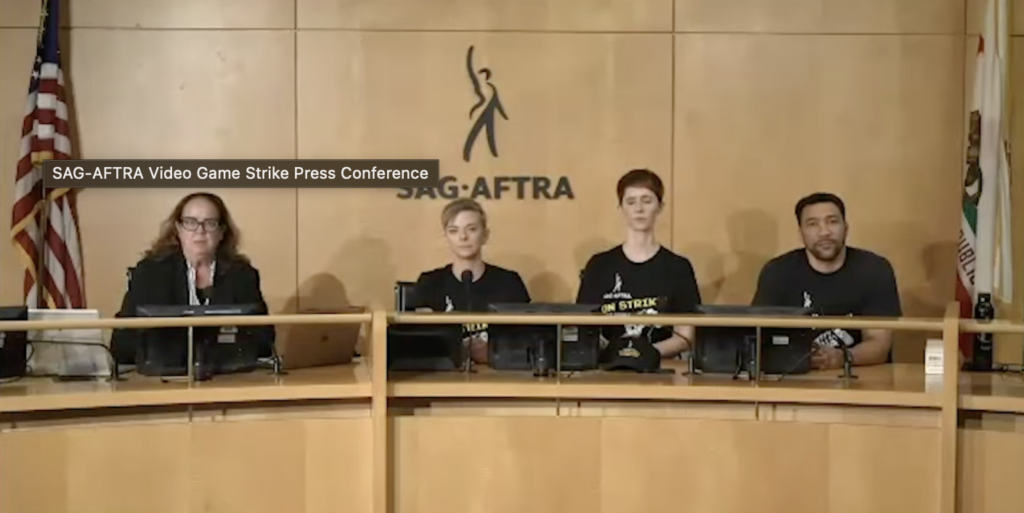Hollywood Performers Demand AI Protections in Gaming Industry
- SAG-AFTRA calls for a strike against major video game makers over AI-related concerns.
- The strike follows a year and a half of negotiations without agreement on AI protections.
- Performers demand fair compensation and informed consent for AI use of their likenesses.
In a significant move, the Screen Actors Guild-American Federation of Television and Radio Artists (SAG-AFTRA) has called for a strike against major video game makers such as Activision, Warner Bros, and Walt Disney. The strike centers around concerns over the use of artificial intelligence (AI) to replicate performers’ voices and physical appearances without fair compensation or consent.
Background and Negotiations
The strike comes after more than a year and a half of negotiations between the union, representing over 2,500 video game performers, and a consortium of video game companies. While progress has been made on several issues, including wages and job safety, the crux of the disagreement lies in the protections related to AI technology.

SAG-AFTRA’s demand is clear: they seek explicit and enforceable language in the contract that protects performers from the unregulated use of AI to reproduce their likenesses. Despite reaching agreements on many fronts, the video game companies have not met the union’s requirements for AI safeguards.
The Union’s Stance
The performers’ union, which last year orchestrated a major strike in Hollywood, is adamant about not allowing companies to exploit AI to the detriment of its members. SAG-AFTRA President Fran Drescher and National Executive Director Duncan Crabtree-Ireland emphasized the necessity of AI protections to ensure fair treatment and compensation for performers.
“We’re not going to consent to a contract that allows companies to abuse AI to the detriment of our members. Enough is enough. When these companies get serious about offering an agreement our members can live—and work—with, we will be here, ready to negotiate,” stated Drescher.
The strike authorization vote, approved by 98.32% of SAG-AFTRA members, underscores the union’s resolve to secure these protections. The union’s leadership has made it clear that they will continue to fight for fair and equitable treatment in the evolving landscape of AI technology.
Video Game Companies’ Response
On the other side, video game companies argue that they have made substantial concessions to address the union’s concerns. Audrey Cooling, spokesperson for the negotiating video game producers, expressed disappointment over the union’s decision to strike, stating that their offer included meaningful AI protections that require consent and fair compensation for all performers.
“We are disappointed the union has chosen to walk away when we are so close to a deal. Our offer is directly responsive to SAG-AFTRA’s concerns and extends meaningful AI protections,” said Cooling.
Implications and Future Actions
The video game industry, known for generating billions of dollars in profits annually, relies heavily on the creative contributions of performers. These actors bring characters to life, making games more engaging and memorable. The strike highlights the growing tension between technological advancements in AI and the rights of creative professionals.
The Interactive Media Agreement, which covers artists providing voiceover and on-camera work for video games, is central to this dispute. The previous agreement, lacking AI protections, expired in November 2022 and has been extended monthly during negotiations.
The strike’s outcome could have far-reaching implications, not only for the video game industry but also for other sectors increasingly incorporating AI technology. The union’s demand for transparency, consent, and compensation in AI use reflects a broader push for ethical standards in AI development and deployment.
Looking Ahead
As the strike progresses, both sides will likely face increasing pressure to reach a resolution. The video game industry must navigate the challenges of integrating AI while respecting the rights and contributions of performers. For SAG-AFTRA, the strike represents a crucial stand for fair treatment in an era where AI’s capabilities are rapidly expanding.
The union remains open to negotiations and has emphasized its willingness to collaborate with companies that respect and protect performers’ rights. Meanwhile, the public and other stakeholders will closely watch the developments, as the strike could set a precedent for how AI technology is managed in creative industries.
The SAG-AFTRA strike against major video game makers underscores the critical need for clear and enforceable AI protections. As performers demand fair compensation and informed consent, the outcome of this strike could significantly influence the future of AI in the entertainment industry. Both sides must work towards a resolution that balances technological innovation with the rights and protections of creative professionals.
